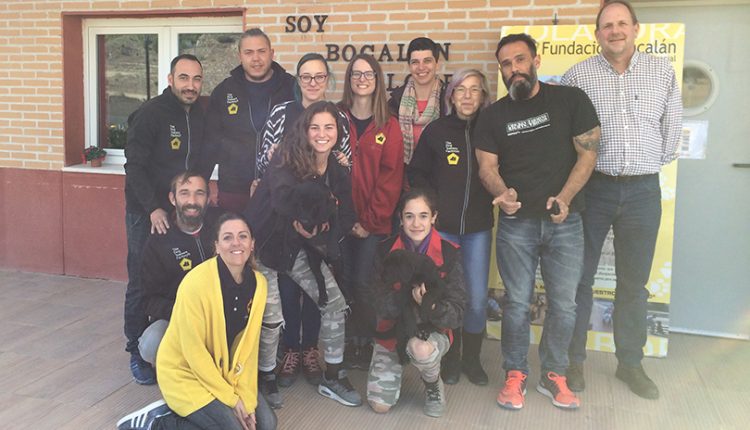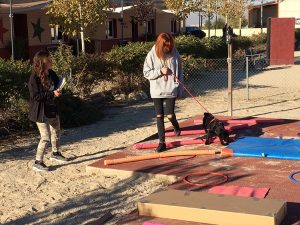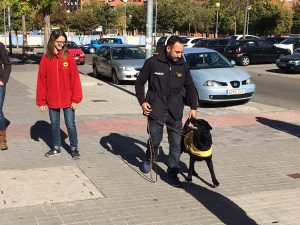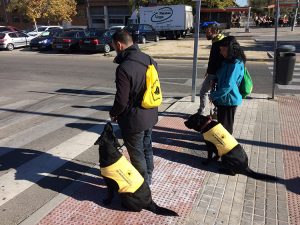How we are assessed and the role of an ADI Assessor
Posted 8 years ago in the Meet the team category
Find out how members of ADI (Assistance Dogs International) are assessed, and what assessing other organisations involves.

Our director of Operations David Bailey has recently been in Spain as part of his role as an assessor for the ADI. In this post, David shares some insight into the assessment process.
As a member of Assistance Dogs UK (ADUK), Canine Partners is also part of Assistance Dogs Europe (ADEU), who form part of Assistance Dogs International (ADI). Phew – that’s a lot of acronyms!
The idea behind ADI is to ensure that its member organisations are regularly assessed to check that they meet the standards required to be a member. This doesn’t mean that organisations who choose not to join may be training dogs and clients of a lesser standard, but with the membership you have a recognised body that will give confidence to service providers.
In the UK, there is no legal requirement for any service providers to allow access to ADUK members only, and anyone with a disability who can show that their dog assists them has legal rights to public places. However, because airlines operate under different rules, some of them will only allow ADI dogs access to their flights. We know that this is challenged regularly by non-ADI organisations including those that deal with owner-trained dogs.
As part of the assessment process, an organisation has to apply for membership and meet the criteria set out. This includes training a certain number of partnerships between human and assistance dog per year as well as having a set number of established partnerships. Established schools also have to be reassessed every five years. Our last assessment was in 2016.
 There are a number of assessors around the world whose job it is to go and carry out these assessments, and I am lucky enough to be one of them. I am “released” by Canine Partners a couple of times per year to carry out these assessments, and every other year assessors attend workshops and conferences that alternate between venues in North America and in Europe.
There are a number of assessors around the world whose job it is to go and carry out these assessments, and I am lucky enough to be one of them. I am “released” by Canine Partners a couple of times per year to carry out these assessments, and every other year assessors attend workshops and conferences that alternate between venues in North America and in Europe.
There is no cost to Canine Partners for me to carry out these assessments, and I love doing them as it is a great opportunity to have a look at what other organisations do and to exchange ideas with all involved.
Without a doubt, these assessments are challenging. ADEU doesn’t have a lot of money to support you with travel which has meant in the past I have had some very lengthy train journeys with numerous changes rather than internal flights. One time, I spent 10 hours on a train across France to reach Nice. Arriving at 11pm, I was then left to wander around a dodgy looking train station to find my hotel!
The organisation that is being assessed will cover all accommodation costs, and as many are very small you try to limit your time away to help them out. On some occasions, if I haven’t been to a place before, I may travel out at the weekend and cover a couple of nights cost in the hotel myself to do some sightseeing before starting the assessment on the Monday.
I have recently spent two days with an organisation called Bocolan, in Spain, who are an established school that trains dogs for adults with disabilities, children with autism as well as adults and children with diabetes. This was a tricky assessment to do as their CEO is also on the ADI board so it could have got very difficult if there was a problem that needed reporting!
What does an assessment look at?
 The assessment covers a lot of factors including:
The assessment covers a lot of factors including:
1. Their charitable status and how they raise their money.
2. How they run their business and look after staff. Do they have first aiders on site, where are the first aid boxes, how often do they practice fire evacuation and so on.
3. The application process for clients applying for a dog. It would cover areas like making sure that all medical files are locked away and that there is a right of appeal for applicants who may get turned down for a dog.
4. The training of the dogs to ADI standards and making sure it is humane, as well as ensuring that the equipment used isn’t designed to cause pain to a dog. The kennels need to be suitable, clean and dry with appropriate enrichment.
5. Are they responsible breeders of dogs and carry out the necessary health checks to ensure they breed healthy dogs.
6. Are the training courses they run for their clients suitable and meet their needs. Once again there is a minimum standard that has to be reached and this includes at least yearly aftercare support (visiting the client in their own home after they have trained with a dog) and making sure that the clients cover everything on the course that they need for when they return home. In my experience most organisations do two week training courses, but you will find that some who have vast areas to cover (South Africa/America), may do a four week course as they may struggle to offer the home support once the course has finished.
During the two days of the assessment, myself and a new assessor who tagged along with me to learn the ropes, spent time with various departments asking questions and observing. This includes meeting clients at the centre, but we also went to visit a young autistic boy and his dog that he has had for two years at his home in North Madrid.
 We also spent a couple of hours out in a nearby small town looking at dog training and also observed some puppy training on site. The school has to provide an interpreter but usually most will have a member of staff that can speak English.
We also spent a couple of hours out in a nearby small town looking at dog training and also observed some puppy training on site. The school has to provide an interpreter but usually most will have a member of staff that can speak English.
Carrying out the assessment is a non-stop job, and also involves working into the evening and occasionally followed by a working dinner. The Spanish culture is that they often go out late for meals so on the first night we didn’t go out until 9.30pm (I’d normally be thinking of bed at that time!).
Sometimes we will finish with one organisation and head on to another – on one occasion I did three organisations in two different countries in one go.
Fortunately Bocalan was a very straightforward assessment to carry out as you would expect with their CEO being on the ADI board – and they were very welcoming and open to our questions.
With Canine Partners having recently gone through our own assessment, I know how nerve-wracking it can be so will try where possible to try and relax the staff. We were informed at the end of the assessment that two of the Bocolan kennel staff took a shot of tequila at 9.00am in the morning to try and calm their nerves before we looked over their kennels!
The criteria for assessment is very straightforward so most schools will pass with perhaps a few recommendations here and there. New organisations can also ask for a mock assessment before the real one if they feel it will help. Unfortunately, on a couple of occasions in the past I have had to pass on the bad news to an organisation that I will be recommending they fail the assessment and things have got quite interesting with some challenging discussions with clearly very disappointed staff members. But it is important to maintain these standards.
I have assessed many schools over the years ranging from huge multi-million pound American schools to a husband and wife team in Scandinavia who keep the dogs in kennels in their garden. For the last 30 years plus, I have also been running training courses for clients in their own home.
On many occasions as an assessor you end up making lifelong friends, and we have had a number of visitors from other ADI schools who want to come along and see what we do which helps in the sharing of experiences.
The role of an assessor is challenging, interesting and enjoyable and I hope goes some way to ensuring that the assistance dog world is transparent and committed to working at high standards and sharing good working practice.